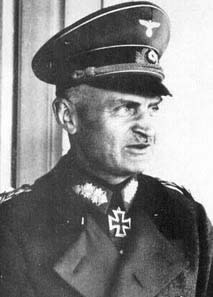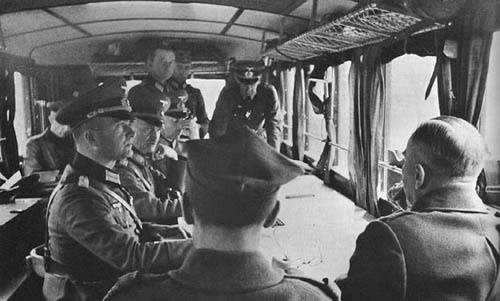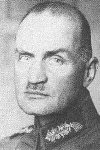Blaskowitz, Johannes
Johannes Blaskowitz was born on July 10th 1883 in Paterswalde , East Prussia. After receiving his 7 year education at the cadet’s school in Köslin and in Gross-Lichterfelde in Berlin he joined the Prussian army as an infantry man. In 1909 Blaskowitz went to the military academy where he graduated in 1911. After this he was assigned to a post in an infantry regiment.
When the Great War broke out Blaskowitz and his regiment were sent amongst others to the eastern front where Germany together with Austro-Hungary fought the armies of the Russian czar. Blaskowitz was awarded several decorations for his excellent leadership and bravery in front of the enemy among which the Iron Cross 2nd and 1st class.
After the war Blaskowitz joined the Reichswehr. This was the German army that was restricted to a 100,000 men following the Treaty of Versailles. In the meantime Blaskowitz had risen to the rank of major. During the Interbellum Blaskowitz led several infantry regiments and later the 2nd Infantry Division.
After Adolf Hitler came to power the German army was expanded. Blaskowitz was actively involved in this. Being an infantry officer he was responsible for expanding the largest arm i.e. the infantry.
Before the 2nd World War actually started he was an army commander during the occupation of the Sudetenland in October 1938 and the subsequent occupation of the rest of Czecho-Slovakia in the spring of 1939. In September 1939 at the official start of the 2nd World War he commanded the 8th Army during the conquest of Poland. The 8th Army ran into heavy resistance during the fighting at the river Bzura where the Poles launched a strong counter offensive. After the hard gained victory Blaskowitz was involved in the negotiations for the surrender of Warsaw. After long negotiations the surrender was signed and Blaskowitz was promoted to Generaloberst and was one of the first recipients of the Knight’s Cross.
After the fall of Poland Blaskowitz was commander of the conquered Polish territory. After the Germans occupied Poland a reign of terror was established by the SS and police troops against the Polish POW’s and the civil population among whom were several million Jews. Blaskowitz was one of the few who collected evidence of these atrocities and presented them to the Commander in Chief, Field Marshall von Brauchitsch. He even sentenced some of the SS-perpetrators to death although these sentences were commuted.
Hitler however would have none of this. On the contrary he was a great supporter of these actions. He called Blaskowitz “childish” and accused him of using ”Salvation Army’s methods”. On May, 29th 1940 Blaskowitz was replaced by Hans Frank.
After the German onslaught in Western Europe in May and June 1940 Blaskowitz was appointed to lead an occupation army in France. He was involved in suppressing the French Résistance. He continued doing this until D-Day on June 6th 1944. Being commander of Army Group G from May 1944 his orders were to repel a possible landing on the southern coast of France. When operation Anvil/Dragoon started on August 15th 1944 Blaskowitz managed to conduct a skilful fighting retreat to the north into Alsace. For this he was awarded the Oak’s Leaves to the Knight’s Cross. At the end of 1944 Army Group G already nearly crossed the German border. Blaskowitz was ordered in January 1945 to launch a diversionary offensive in Alsace-Lorraine under the name of operation Nordwind. This was the German hope to put new life into the by now ground down Ardennes offensive. The fighting continued from January 1st to January 25th 1945. After heavy fighting this attack, much like the Ardennes offensive, turned out to be a costly failure for the Germans. Blaskowitz received the Swords to the Knight’s Cross.
After this Blaskowitz was transferred to the Fortress Holland where he became commander in chief of Army Group H. Although he cooperated with the Allies concerning the food droppings for the starving Dutch in the west of Holland (operation Manna) still more than 18.000 civilians died from starvation during the cold winter of 1944-1945. Neglecting Hitler’s orders for the total destruction of the infrastructure and industry some very heavy damage was done to port facilities and on April 17th 1945 the Wieringermeer polder was inundated. On May 5th he was summoned by the Canadian general Charles Foulkes to hotel “De wereld” in Wageningen to negotiate terms of capitulation. He asked for and was granted 24 hours’ time for reflection about the conditions and a day later he signed the surrender in a destroyed farm in the hamlet of the Nude on the road from Rhenen to Wageningen.
During the Nuremberg trials Blaskowitz was charged with crimes against humanity. Quite bitter for someone who had tried to stop the crimes of SS and police in occupied Poland. Blaskowitz couldn’t handle affairs anymore and committed suicide on February 5th 1948 by jumping off a balcony into the inner courtyard of the court building. Rumours circulated that he was killed by SS-men because of his resistance to war crimes committed by the SS but this was never proven.
Images
Information
- Article by:
- Tom Notten
- Translated by:
- Peter ter Haar
- Published on:
- 19-01-2025
- Feedback?
- Send it!












